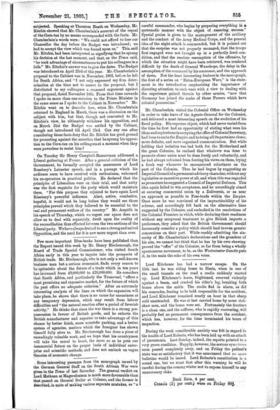Mr. Chamberlain visited the Colonial Office on Wednesday in order
to take leave of the Agents-General for the Colonies, and delivered a most interesting speech on the evolution of his fiscal policy. His supreme object, which had never varied from the time he first had an opportunity of stating what were his ideas and aspirations in accepting the office of Colonial Secretary, had been to unite the Empire and to bring all its parts into closer, more definite, and more organised communication. But while holding that isolation was bad both for the Motherland and the great Colonies, he realised that whatever was done to promote closer union must be done freely and voluntarily, and he had always refrained from forcing his views on them, trying a fresh way whenever he encountered reluctance on the part of the Colonies. Thus he had begun by suggesting an Imperial Council of a permanent advisory character, without any legislative or executive power at all, and when this was regarded as premature be suggested a Council of Imperial Defence. This idea again failed to win acceptance, and he accordingly aimed at securing commercial union by a Zollverein, or as near an approach as possible to Free-trade within the Empire. Once more he was convinced of the impracticability of his scheme, and accordingly fell back on the alternative lines suggested by the Colonies, and embodied in the resolutions of the Colonial Premiers in which, while declaring their readiness without any reciprocal treatment to give British imports a preference, they asked that the British Government should favourably consider a policy which should lead to even greater concessions on their part. While readily admitting the sin- cerity of Mr. Chamberlain's declarations and the grandeur of his aim, we cannot but think that he has by his own showing proved the "offer" of the Coloniee, 30 far from being a wholly spontaneous movement, to be, as the Westminster Gazette puts it, in the main the echo of his own voice.


























































 Previous page
Previous page